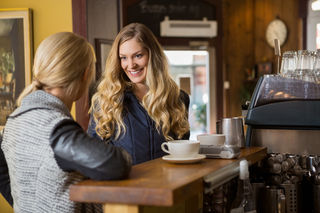1. Go ahead: Talk to strangers.
Posted Feb 08, 2016
 Building stronger connections with those around us—not just our romantic partners—can
lead to a happier, healthier, more successful, and easier life. Our
relationships help us live and work from our sweet spots by bringing us
both strength and ease.
Building stronger connections with those around us—not just our romantic partners—can
lead to a happier, healthier, more successful, and easier life. Our
relationships help us live and work from our sweet spots by bringing us
both strength and ease.Love and the other emotions we experience when we feel connected socially—like affection, warmth, care, fondness, and compassion—are a powerful force for a rich and rewarding life. In Love 2.0, Barbara Fredrickson writes:
"Love is our supreme emotion: its presence or absence in our lives influences everything we feel, think, do, and become. It’s that recurrent state that ties you in—your body and brain alike—to the social fabric, to the bodies and brains of those in your midst. When you experience love . . . you not only become better able to see the larger tapestry of life and better able to breathe life into the connections that matter to you, but you set yourself on a pathway that leads to more health, happiness, and wisdom."Similarly, the longest running study of human development, The Harvard Grant Study, makes it clear that “the most important influence, by far, on a flourishing life is love,” as one of the researchers behind the study, George Vaillant, put it in Triumphs of Experience.
So if we best predict our happiness and our success by the quantity and quality of our relationships with others, the question remains: How can we increase the amount of love we get in our lives?
Here are a few of my favorite ways to feel more connected:
1. Talk to strangers—or at least smile at the barista.
A half dozen recent studies demonstrate the power that a simple positive interaction with a stranger has to make us happier. In one study, researchers randomly assigned volunteers to talk to the stranger who sat down next to them on the train during their morning commute. Pretty much no one thought going in that they were going to enjoy giving up their morning solitude to make small talk with someone they didn’t know and would probably never see again.
But guess what?
The volunteers enjoyed their commute more than the people in the study who simply read their books and finish their crossword puzzles in silence. What’s more, not a single stranger snubbed the study participants. Other research indicates that the strangers whom participants chatted up in public spaces also think they won’t want to talk, but then end up enjoying themselves as well.
The takeaway is that often the easiest way for us to connect with others is to slow down just enough to make eye contact, smile, and—if we’re feeling brave—start a conversation. Research shows that just acknowledging someone else’s presence through eye contact and a smile helps people feel more connected.
2. Send loving thoughts to others.
When Fredrickson and her colleagues want to study what happens when people increase their daily diet of love, they simply ask people to do a loving-kindness meditation (link is external) once a day. This is a private, quick, no-contact-with-others way to give. Also called metta, loving-kindness meditation is the simple practice of directing well wishes toward others. Loving-kindness meditation isn’t complicated—it really isn’t anything more than using your imagination to send love and well wishes to others—but this practice, for many people, is more effective than Prozac.
If you are going to do only one thing today to bring more love and connection into your life, do this.
Even if you aren’t likely to sit in meditation everyday sending good thoughts to yourself and others, you can use metta throughout the day as a tactic to increase feelings of well-being, compassion, and connection. Perhaps put a sticky note on your bathroom mirror, refrigerator door, or car dashboard—wherever you tend to be most exhausted or overwhelmed or isolated—to remind you to pause and cultivate a loving thought or two.
3. Master the most important relationship skill in the history of the universe.
Perhaps the most useful skill we can master for building strong connections with others is the ability to deliver an effective apology (link is external). When a relationship starts to break down, the best repair, bar none, is almost always an apology.
Think about it: If a relationship is dented or sputtering, someone probably made a mistake. Perhaps it was a benign comment—a well-meaning but poorly understood suggestion—or maybe it was more toxic—you got caught in a lie, or didn’t follow through on a commitment.
People make mistakes in relationships All. The. Time. Not just bad people, or weak people—all people. Our mistakes are what make us human. And even when we don’t think we’ve made a mistake, other people will often find the errors in our ways. We human beings are walking offenders.
So if we’ve done something that offends someone else—whether or not we feel we are to blame—should we apologize?
Yes.
I believe it almost always serves our highest good to apologize if we’ve hurt or offended someone else—even if we think the offended person’s anger is unjustified, if we have a perfectly good excuse for what happened, or if our intentions were all good.
But all apologies aren’t created equal (as any parent who has watched a child spit out a worthless, forced “sorry" knows). So what makes a good apology? After studying the question extensively, Aaron Lazare (link is external) developed perhaps the most robust criteria to date for effective apologies, which informed this three-step method for making a good apology (link is external).
没有评论:
发表评论